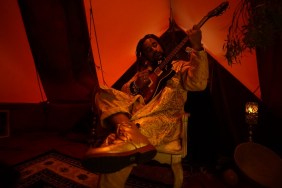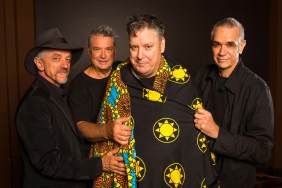“Howz ya dinner?” enquired Gareth Liddiard, swigging goon from a plastic water bottle and squinting out at the seated diners. “I can’t see many food stains out there but then again, I can’t see many white shirts either.”
For all his lexical brilliance in verse, Liddiard has far fewer words at his disposal when caught in banter not in song. Clearly half-tanked at Friday night’s solo gig, he makes several late retreats from anecdotes mumbling, ‘shut up, shut up, just play the song’. It turns out the wiry, wild-eyed front man from The Drones is nowhere near as intense as his songs. Or he hides it well.
Yet his charisma suffers little. He’s unexpectedly funny. And as soon as he starts playing he so completely inhabits the world he evokes that he becomes lost to us anyway. All humour leaches from the room; he’s intense again.
Through him surface stories about dysfunctional country towns simmering with racial tension, war wounds, suicide, and alcoholism, like ‘Locust’ (They built a prison and it tempered in the sun / it rose up off a plateau like the last tooth in a gum) and ‘I Don’t Want to Change’ (I lived in the country where the dead wood aches / In a house made of stone and a thousand mistakes / Where the glory of morning got crushed by the burden of day).
He offers himself up as the conduit for characters overlooked by colonial history books, like the executioner of famous cannibal convict, Alexander Pearce (Tell me how are you coping / Now that it’s time to go / Can you see the chariots / Swinging low / Up over the Huon pine and out to the snow/ How much treachery/ Can you possibly know?). ‘Jezebel’ – about the atom bomb – was another gruelling highlight (Strontium-90 / Removed from milk / As curious an entity / As bullshit writ on silk).
Between songs, he tells stories about his underwear, or laments his habit of hitting his head on the mic. The contrast in his demeanour is stark but that’s hardly surprising. Being trapped in a Drones song must be not unlike hell. Liddiard often seems less like a singer and more like the poor wretch chosen to channel histories that are dark and filled with horror. Such is his monumental talent.
But just when you pigeonhole him as a modern-day Henry Lawson (though considerably more bitter), out comes ‘The Drifting Housewife’, a song about the universal anguish of marital woe. (‘I was more worried about taxes / When my lovely red-eyed bride / Became a hair-splitting believer / That I should be vilified / My hopes were razed like three-day growth / Then raked by nervous ticks / Was I the bulls-eye or the launch-pad? / I could never find the switch’).
For fans of Liddiard’s verse, the unplugged show was a way to experience its horrible, apocalyptic glory free from rock postures and the distracting volume of amplification. His is a savage vision and one that’s often based in the past, but somehow it still feels more relevant than a thousand columnists in The Weekend Australian trying to give utterance to similar themes.
If you haven’t listened yet, listen. And if The Drones’ screeching guitar hurts your ears, read the lyrics instead. As for Liddiard, if he plays solo again, don’t miss it. He’s likeable, he’s brilliant and he’s ours. And for better or for worse, compatriots, we’re his too.












